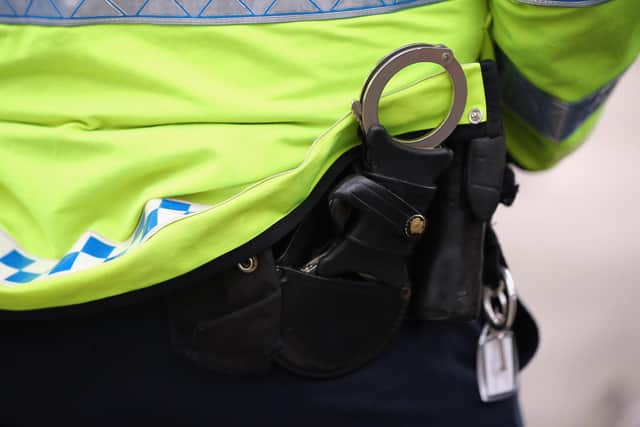Derbyshire Black people five times more likely to be arrested than white people
and live on Freeview channel 276
Home Office figures reveal 518 arrests of black people were made in Derbyshire in 2020-21 - 51.3 arrests per 1,000 black people in the area.
However there were just 9.6 arrests per 1,000 white people, meaning a black person was 5.3 times more likely to be arrested.
Advertisement
Hide AdAdvertisement
Hide AdArrest rates were up on 2019-20 - before the coronavirus pandemic - when 47.8 arrests per 1,000 black people and 8.9 per 1,000 white people were made.


Across England and Wales black people were 3.3 times more likely to be arrested than white people in 2020-21.
Civil lobbying charity Liberty - which campaigns for justice and equality – accused the police of acting unjustly towards ethnic minorities and called on the Government to reduce police powers.
However Derbyshire Constabulary, commenting on the figures, say they are too broad and fail to take account of specific policing operations in smaller areas or cross-border criminality.
They say both variants could "affect disproportionality”.
Advertisement
Hide AdAdvertisement
Hide AdSuperintendent Jim Thompson said: “Police powers such as stop and search and the power of arrest are important and effective tools in our efforts to keep communities safe and it is important that they are used appropriately and proportionately.
“Here in Derbyshire we understand how vital it is that our communities have trust and confidence in us to provide a fair and inclusive service and we understand that disparities can undermine that trust or divide our communities.
“It is worth noting that the figures here show an overall county wide comparison and are not broken down into areas where specific policing operations have taken place or account for cross-border criminality, and this could affect disproportionality.”
Emmanuelle Andrews, policy and campaigns manager at Liberty, said the figures "highlight the injustices that black communities face across the criminal justice system".
Advertisement
Hide AdAdvertisement
Hide AdMs Andrews said: "The police should not be handed more powers, and their existing ones must be rolled back."
But the Home Office says "more is being done in policing than ever before to ensure everyone is treated fairly and without prejudice".
A spokesperson added: "We now have the most diverse police force in history and have extensive safeguards in place to hold the police accountable."
Dorset Police had the largest disparity in arrest rates, with black people nearly 11 times more likely to be arrested, while North Yorkshire had the lowest – though a black person was still twice as likely to be arrested.
Advertisement
Hide AdAdvertisement
Hide AdDerbyshire Police’s Supt Jim Thompson added: “We are committed to making sure that policing is more inclusive, diverse and reflective of the communities we serve and we are in full support of the recently launched National Police Race Action Plan, which is looking to develop a new national approach to help identify and tackle racial disparities in the use of powers, particularly those that have the greatest impact on Black people.
“Work is ongoing to better understand disproportionality and we continually seek to improve legitimacy.
“Some of the ways in which we engage and listen to our minority communities include external scrutiny panels through the Independent Advisory Group, Office of the Police and Crime Commissioner and Youth Commission who have access to officers’ body worn video when reviewing incidents.
"They provide feedback on stop and search and use of force. It is important to us that these scrutiny panels are representative and we regularly recruit to those.
Advertisement
Hide AdAdvertisement
Hide Ad“We will continue to engage with and listen to the concerns of our Black communities and look to tackle the issues that really matter to them.”
